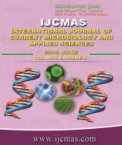


 National Academy of Agricultural Sciences (NAAS)
National Academy of Agricultural Sciences (NAAS)

|
PRINT ISSN : 2319-7692
Online ISSN : 2319-7706 Issues : 12 per year Publisher : Excellent Publishers Email : editorijcmas@gmail.com / submit@ijcmas.com Editor-in-chief: Dr.M.Prakash Index Copernicus ICV 2018: 95.39 NAAS RATING 2020: 5.38 |
Groundnut is the major oilseed crop in Chittoor district of Andhra Pradesh grown in 1,40,000ha during kharif and rabi seasons. PBND and PSND are major problems in groundnut cultivation causing yield losses to the farmers. On Farm Trial on assessment of PBND and PSND tolerant groundnut variety Kadiri Amaravathi was conducted during rabi, 2018-19. In Kadiri Amaravathi variety 3.4 – 22.1% thrips damage was recorded. Whereas in Narayani variety 8.2 to 35.7% damage was recorded. Thrips damage was more at 80-100DAS i.e. during February and March months. Incidence of PBND & PSND was low during the season in both the varieties. In Kadiri Amaravathi 0.08% and 0.22% of PBND & PSND was noticed whereas in Narayani 4.06% and 4.49% of PBND & PSND was recorded. Though thrips damage was recorded up to 20-35% in both the varieties, PBND and PSND damage was low. Absence of Thrips palmi, vector of viral diseases might be the reason for low incidence of viral diseases. Average yield of Kadiri Amaravathi variety (2500kg/ha) was 20.6% low than Narayani variety (3150kg/ha) during the season.
 |
 |
 |
 |
 |